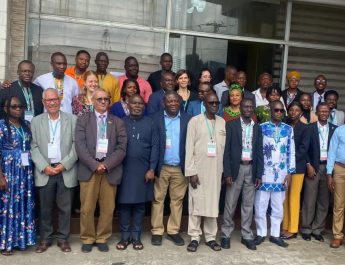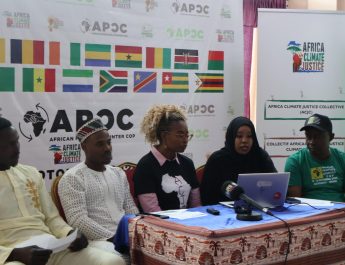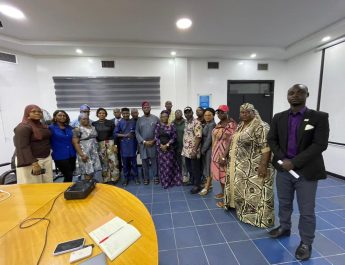A gathering of academics, activists, environmental and climate crusaders urges governments, corporations and good spirited individuals to kick start the process of seeking justice for the planet, as it insist if the current mindless exploration of fossil fuel and other natural mineral resources continues, humanity may not live long enough to reap the expected benefits
By Edu Abade
Given the decades of oil and gas, as well as other natural mineral resources exploration by multinationals and the environmental impacts their activists have caused humanity, it would have been safer to end the exploitation of such minerals but human needs keep pushing the planet to the precipice, while ignoring the consequences.
To that extent, the Environmental Defenders Network (EDEN) in collaboration with the Nigerian Branch Committee of the International Law Association (ILA) and Chima Williams & Associates (CWA) gathered academics, activists, civil society and media practitioners in a hybrid meeting to explore ways of attaining a sustainable environment for the future with the theme: Justice For The Planet: Strengthening Climate And Environmental Accountability In Nigeria.
Those who spoke at the webinar are Prof Ngozi F. (Stewart) Unuigbe of Environmental Law Department, University of Benin, Dr. Eghosa Ekhator, an Associate Professor of International and Environmental Law, University of Derby, United Kingdom (UK), Dr. Chidebe Nwankwo, Senior Research Fellow, National Institute for Demographic Studies, National Assembly, Nigeria, Dr. Brown Umukoro, Senior Lecturer, Faculty of Law, Delta State University (DELSU), Dr. Mustapha Adigun, Reader, Faculty of Law, University of Ibadan and Eric Omare, a legal practitioner.
Others are the Executive Director, EDEN, Barrister Chima Williams, Deputy Executive Director, EDEN, Alagoa Morris, Deputy Head of Chambers, Chima Williams and Associates (CWA), Director of Programmes at EDEN, Philip Jakpor and Director, Climate Justice at EDEN, Mariere Ubrei-Joe, among others.
In his presentation titled: The Drive Towards Climate Justice And Environmental Accountability: A Nigerian Perspective, Williams submitted that policies do not provide the tips to ensure that the Nigerian environment is protected to ensure that there is accountability in our environment sector and the starting point is our very constitution.
“The 1999 Constitution (as amended) puts the environment in an unenforceable provision of the Constitution so that you cannot seek for environmental accountability through litigation as of right.
There are other provisions of the Constitution that put petroleum resources under the exclusive legislative list, which means only the Federal Government can regulate it. This has also denied States legislatures, and judiciary from having anything to do or say strongly about petroleum issues.
“And in this country, especially in the southern part of Nigeria, the greatest environmental spoilers and destroyers are the petroleum sector operators and not everybody can legislate or talk about such issues.
The constitution has bestowed on the Federal Government the rights over all mineral resources. This means that the Federal Government owns the mineral resources and not the Federal Republic of Nigeria.
“We need to look at all the issues of the land use act, which ceded all the lands in the states to the governors, who hold it in trust for the citizens. We can best explain as citizens how this governance manages these resources that belong to all of us.”
“Even the National Response and Detection Agency NOSDRA can only regulate when there is a spill. So these are impediments that have been put on the way of Nigerians seeking environmental accountability and environmental justice. However, critical lawyers have shown a pathway that you can still protect the environment, protect citizens rights, seek for accountability and get accountability from the spoilers of our environment by looking at environment, which is in Chapter 2, matching it with the issues related to life.
“The African charter for human and people’s rights states clearly that citizens are entitled to enjoy an environment that is conducive for their development. So if that right is denied, if you handle it, the environment will only give us.
“There is an opportunity before us which is the Constitution amendment process that is ongoing. Citizens can seize the opportunity provided by the public hearings that are ongoing. The demand that’ the issues related here to the environment should be moved from chapter 2 of the Constitution to chapter 4.
Secondly, issues relating to petroleum resources management should be moved from the exclusive legislative list of the Constitution to the concurrent legislative list so that both states and the Federal Government can legislate and take action on issues related. Issues that bestow the resources of Nigeria on the Federal Government should be replaced with the Federal republic of Nigeria so that citizens can be entitled to their resources.
In his keynote speech, Dr. Eghosa Ekhator argued that climate change has a lot of negative impacts including the short-term and long-term impacts, adding: “If you look at what is happening around the world in Nigeria and the UK. In northern Nigeria, the impact of climate change is very bad on most societies, and more food than not, they already vulnerable people in society, the women, the children who live with disability bear the brunt of climate change, because in some societies where women are already discriminated against by the government, by custom, by religion and where.
He lamented that there’s virtually nothing done to protect the vulnerable members of society and that Nigeria tends to suffer one of the worst impacts of climate change. So in some parts of the world, and litigation cases, the laws are not effective or certain laws are absent. I’m not a fan of creating new laws. I think if a system is not working, why do you need to create new laws? You need to use what you have already to impact the system. So litigation is a very good strategy that can be used to do that. So, for example, in many parts of the world now, litigation, climate, litigation has been used by several stakeholders between local communities, children, youth, and women, as a means to hold governments accountable for their climate change commitment.
Also, Ubrei-Joe said the essence of climate justice movement is to keep individuals, governments and industries accountable while redirecting the world toward climate action, noting that the work of Friends of the Earth International, Climate Action Network International, the Global Alliance for Incinerator Alternatives (GAIA) and Oil Watch in advancing climate justice globally. He explained that these groups have been instrumental in mass mobilization, protests during COPs, bilateral engagements, policy advocacy, and legal actions.
Citing the 2021 case where Niger Delta communities won compensation from Shell, he described it as an example of how climate litigation is becoming a tool for accountability. He added that community-led solutions are emerging to redirect the world towards a just transition. He questioned whether the compensations being paid by polluters truly address the scale of environmental damage suffered by affected communities.
On his part, Alagoa shared experiences from grassroots climate organizing in the Niger Delta. He expressed delight at being part of the event and spoke about the increasing impact of climate change in the Niger Delta, including increased rainfall and the severe flooding experienced in 2022. He explained that climate change-induced monster floods, which began around 2012, peaked in 2022 and were the highest so far experienced in this part of the world.
He said the government needs to do more to create higher grounds in states like Bayelsa that are below sea level, noting that federal and state government interventionist agencies have roles to play in this regard. He also called on the federal government to complete the Hausa Dashi Dam, which was abandoned after the Shehu Shagari administration was overthrown.
He noted that rural communities are struggling to adapt, with farmers replanting quickly between floods to avoid food insecurity. He highlighted the challenges related to housing, stating that climate change disruptions require intentional efforts to guide housing designs and settlements to reduce vulnerability.
Alagoa also discussed ongoing environmental pollution caused by the oil industry, noting major incidents such as the Bonga spill of December 2011, the Chevron North Apoi explosion of January 16, 2012, Agip’s Brass Terminal incident of November 27, 2013, and Shell’s major Seibou spill in January 2015, all of which were due to equipment and operational failures.
He said despite these incidents, no compensation was paid to victims apart from Agip, which paid what it liked to a few affected communities. He added that investigations revealed many of the third-party interface spills and sabotage incidents were sponsored by some oil company staff, both serving and retired, as well as contractors.
In his intervention, Jakpor, who spoke virtually on The Role Of Media In Climate Reporting, explained the role of the media in shaping climate change narratives in Nigeria, noting that media coverage of climate issues in Nigeria has evolved gradually, with a focus on the impacts of extractive industries only beginning to grow after the Koko, Delta State toxic waste incident in 1988.
He said in the 1990s, the activism led by the late Ken Saro-Wiwa galvanized further interest in environmental reporting, but most media organizations only established environment desks in the late 2000s, adding that while climate reporting has recently gained prominence in Nigeria, it often lacks depth in explaining the complexities of climate change in ways that are accessible to the public.
Jakpor highlighted that the role of the media is to document and shape public perception and understanding of climate change, serving as a bridge between complex research findings and policymakers as well as the general public. He explained that earlier climate communication focused heavily on IPCC reports, UNFCCC processes, global warming, and greenhouse gas emissions, often using approaches that painted a gloomy picture without clear pathways for local action.
He stated that for climate coverage to have real impact, stories should revolve around the immediate environment, such as agriculture, water stress in rural and urban areas, and rising temperatures. He emphasized the need to tell the stories of people affected by climate change, including communities, women, children, vulnerable groups, and workers, while linking these stories to local and national economic impacts in clear and understandable terms.
He added that it is important to spotlight the industries behind the climate crisis, mentioning fossil fuel companies like Shell, Chevron, BP, TotalEnergies and ExxonMobil, as well as agro-industrial plantation companies.
Others who spoke at the webinar, including Eric Omare, who presented a paper on Litigation and Local Communities Under The Nigeria Petroleum Industry Act (PIA) 2021, Brown Umukoro, who focused on Youth-Led Climate Litigation and Tafeeq Alatise, who dwelt on Global Justice Movement For Combating Climate Crises, stressed the need for stronger awareness on climate issues and action, as well as legal education for adequate skills and interest in environmental laws in the country going forward.




